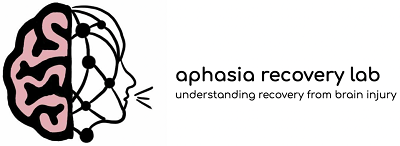Have you or someone close to you recently had a stroke?
Annually, nearly 800,000 individuals in the US experience a stroke. About 21-38% of these individuals will experience a long-lasting language disorder. You may have heard the word aphasia used to describe it. What exactly is aphasia? Aphasia is the collection of language difficulties that occur after brain injury, typically after a stroke.
Aphasia presents itself in a variety of ways. Aphasia may impact one’s ability to speak, understand what is being said, read, and write. Aphasia can affect just one aspect of language or many aspects of language. Aphasia can also range from being mild to severe. Importantly, aphasia has no impact on one’s intelligence, only their language. When interacting with someone with aphasia it is critical to speak clearly, slowly, allow time for response, and never be diminutive. The ability to communicate has a direct impact on our relationships, jobs, and education. As a result, the effects of aphasia can have a dramatic impact on the day-to-day activities of an individual.
Below you can find additional resources about aphasia and more information about our ongoing studies that are open to individuals with aphasia.
Contact us
510-846-8905
dronkers@berkeley.edu
ivanova@berkeley.edu
